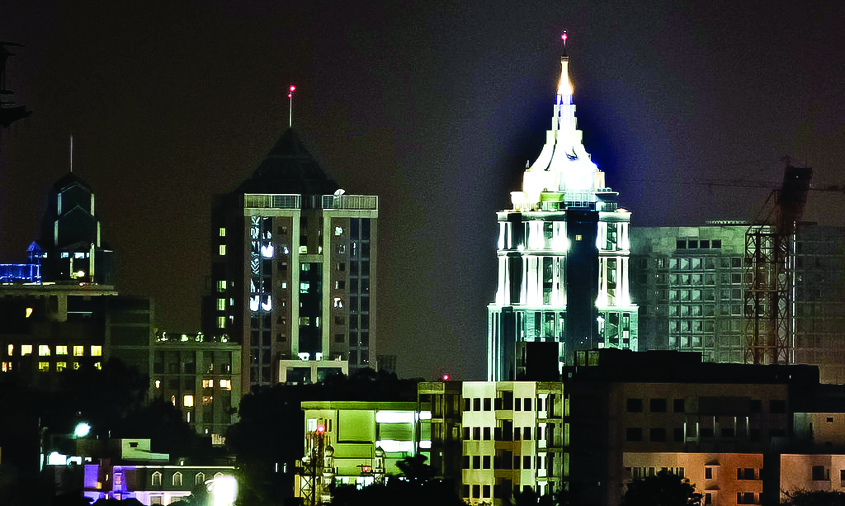Askew: A short biography of Bangalore
By T.J.S. George
Publisher: Aleph Book Company
Pages: 113
Price: Rs 299
Bangalore has beckoned to me ever since I went there first some years ago. I wanted to call it home despite the chaotic traffic, perhaps because I had largely experienced it from the backseat of an air conditioned car driven by my cool-tempered brother in law, but we are digressing here. The city, as I was saying, has always beckoned to me, and I could never put my finger on exactly why that was, but I felt I would like to settle there someday. Meanwhile, dozens of others I have known have flocked to Bangalore, their reasons for migrating being no mystery, unlike my subliminal connection with the city. Bangalore is where the jobs are. Well, many of the jobs are. And that is what leads tens of thousands there like the pied piper’s irresistible tune.
Bangalore, or Bengaluru as it is called now, but let us say Bangalore for reasons that will be clear later, has earned the familiar epithet of the IT capital of India. Many years of planning, though not exactly with the present destination in mind, put Bangalore on the path of industrial growth, and towards the end of the 20th century, the information technology revolution stormed the city, changing its character to the one we know today.
But beneath the dizzying pace of its IT life, Bangalore has an old soul, remembered by few and unknown to many washing into the city and settling there like surf on a beach only to retreat to other places, being replaced by a new wave of settlers who never quite make the city their home. Bangalore, in this manner, is in constant flux. But there was a time when, with its verdant spaces, hills and lakes, the city was a pensioner’s paradise, lending it some qualities of the “old soul” perhaps, but that wasn’t all. What gives Bangalore an old school charm goes back in history to the very first people who called it home and the ones who subsequently came and gave the city its underlying appeal, where aesthetes remained at the centre of things.
Before the pensioners, Bangalore belonged to the British, who built their cantonment there which headquartered the oldest of the three engineering groups of its Army.
And before them Tipu Sultan built his fortresses amid the hillocks and before him Bangalore’s fabled founder Kempegowda planned the city on his wise mother’s instructions — plant trees and build lakes, which in turn, combined with a favourable climate, drew the colonials and then the pensioners. At about the end of the 19th century, Basavangudi, an area in South Bangalore, became the sought-after address for diwans of Mysore state, judges of courts and famous administrators, men and women of the letters and the arts. Until one day it all went Askew.
At about the end of the 19th century, Basavangudi, an area in South Bangalore, became a sought-after address for diwans of Mysore state, judges of courts and famous administrators, men and women of the letters and the arts. Until one day it all went askew.
That’s what veteran journalist T.J.S. George calls his short biography of Bangalore, and not Bengaluru, because, as he says, some sounds are more enabling in the English language, and therefore throughout the book he omits the “uru”, which reclaimed the city from its colonial usurpers, who are as entwined in the character of Bangalore as any of the natives.
How did things go askew? With the onslaught of information technology, and the lack of any information or technological/scientific planning on the part of the city’s administrators.

George’s insights into Bangalore reveal to us how the city’s blueprint transformed it into the hub for industries, startups and the IT. With interesting anecdotes, engagingly written in his inimitable style, he pieces together Bangalore to the outsider, and insider, who has viewed the city as a (un)finished puzzle where everything as though by chance fell into place to sprout an IT industry overnight, and which since then has moved skyward. George connects us with Bangalore’s roots.
For those acquainted only with Bangalore’s pub culture for instance, and who associated the flourishing pubs as a recreational necessity for a thriving IT centre, would perhaps be surprised to learn that the pubs came before their millennial patrons. In fact, it may be revelatory to learn that “alcohol was the city’s defining industry”. The abundance of coconut and palm trees provided primary resources for the drinks. Interestingly, the first beer producing unit was set up by the colonials themselves inside the cantonment to wean away their men from local haunts and its unsuitable thrills. This factory, called Bangalore Breweries, was later bought up by United breweries and merged with it by Vittal Mallya, whose son, Vijay Mallya carried on the legacy until now.
Askew reveals many more such fine nuggets about the beginnings of the city, about the days when planning and cultural and culinary pursuits was prime and how that went for a toss as Bangalore struggled with a changing demography, increasingly being taken over by the fast life. The book is also a detailed and scathing critique of the failure of the municipality and administration in executing their duties. As the title suggests, Askew keeps returning to the monumental mismanagement of Bangalore’s growth by its corrupted leaders and at the same time salutes those who helped the city hold on to its soul force — the writers, book lovers, musicians of Carnatic classical and rock, artists, dancers and theatre persons.
This biography of Bangalore is a quick, charming and enlightening read for an outsider and a resident alike.

